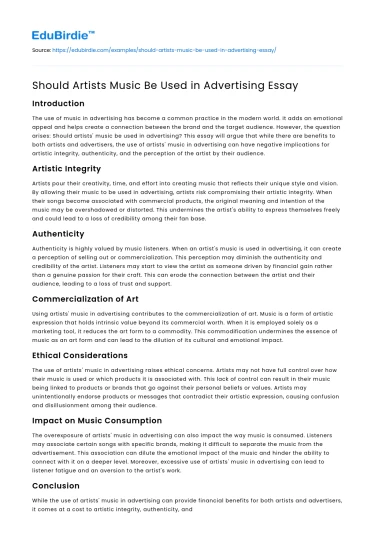Introduction
The use of music in advertising has become a common practice in the modern world. It adds an emotional appeal and helps create a connection between the brand and the target audience. However, the question arises: Should artists' music be used in advertising? This essay will argue that while there are benefits to both artists and advertisers, the use of artists' music in advertising can have negative implications for artistic integrity, authenticity, and the perception of the artist by their audience.
Artistic Integrity
Artists pour their creativity, time, and effort into creating music that reflects their unique style and vision. By allowing their music to be used in advertising, artists risk compromising their artistic integrity. When their songs become associated with commercial products, the original meaning and intention of the music may be overshadowed or distorted. This undermines the artist's ability to express themselves freely and could lead to a loss of credibility among their fan base.
Save your time!
We can take care of your essay
- Proper editing and formatting
- Free revision, title page, and bibliography
- Flexible prices and money-back guarantee
Authenticity
Authenticity is highly valued by music listeners. When an artist's music is used in advertising, it can create a perception of selling out or commercialization. This perception may diminish the authenticity and credibility of the artist. Listeners may start to view the artist as someone driven by financial gain rather than a genuine passion for their craft. This can erode the connection between the artist and their audience, leading to a loss of trust and support.
Commercialization of Art
Using artists' music in advertising contributes to the commercialization of art. Music is a form of artistic expression that holds intrinsic value beyond its commercial worth. When it is employed solely as a marketing tool, it reduces the art form to a commodity. This commodification undermines the essence of music as an art form and can lead to the dilution of its cultural and emotional impact.
Ethical Considerations
The use of artists' music in advertising raises ethical concerns. Artists may not have full control over how their music is used or which products it is associated with. This lack of control can result in their music being linked to products or brands that go against their personal beliefs or values. Artists may unintentionally endorse products or messages that contradict their artistic expression, causing confusion and disillusionment among their audience.
Impact on Music Consumption
The overexposure of artists' music in advertising can also impact the way music is consumed. Listeners may associate certain songs with specific brands, making it difficult to separate the music from the advertisement. This association can dilute the emotional impact of the music and hinder the ability to connect with it on a deeper level. Moreover, excessive use of artists' music in advertising can lead to listener fatigue and an aversion to the artist's work.
Conclusion
While the use of artists' music in advertising can provide financial benefits for both artists and advertisers, it comes at a cost to artistic integrity, authenticity, and the perception of the artist. The commercialization of art and the potential compromise of the artist's values should be carefully considered. Artists should have the autonomy to decide whether their music aligns with the message and values of a brand. Ultimately, preserving the integrity and authenticity of artists' music is vital for maintaining the emotional connection between the artist and their audience, and for safeguarding the cultural significance of music as an art form.






 Stuck on your essay?
Stuck on your essay?

